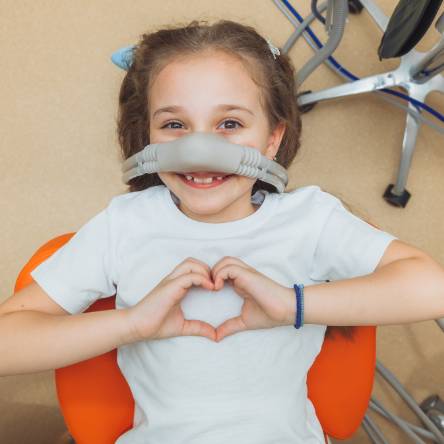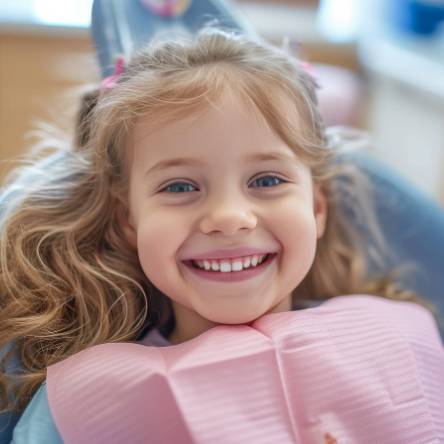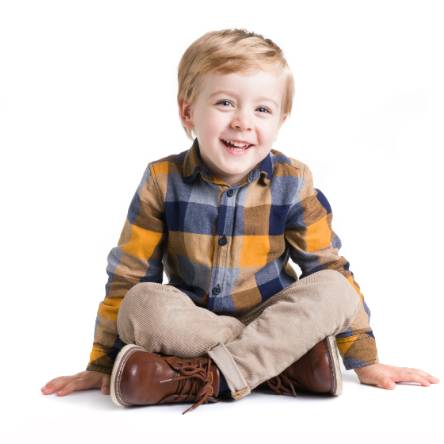Even when we are our friendliest, most fun selves, some children are still scared of dentistry. We are experienced at building rapport and making a comforting environment, but some young people just need an extra dose of calm.
Comfort dentistry offers several sedation methods that relax a child, making procedures easier and quicker. Sedation can also improve safety for a child who is not yet able to get through certain treatments in any other way.
Oral Health and Peace of Mind
When it comes to the emotional and physical well-being of your child, you are going to want exceptional care that you can trust. Being informed and educated on comfort dentistry and how to help your child get the treatment they need, will aid your child in their dental journey and overcome dental anxiety before it starts.
Preparing Your Child for the Dentist
Comfort Dentistry is designed to help parents and patients feel confident and comfortable during treatment and combat dental anxiety. The earlier children feel relaxed at the dentist, the better they will be in the future with treatment and taking care of their oral health. You can help prepare your children before their appointment with your own at-home comfort dentistry routine.
Positive Talk
Talk positively about your own dental experiences. Mention how good it feels to have clean teeth and how fun it is to get a prize at the end.
Read Books and Watch Shows
Read books and watch shows with your child about going to the dentist. This can help familiarize them with what to expect and make the experience less intimidating.
Avoid Negative Words
Refrain from using words like “shot” or “hurt.” We use kid-friendly language to make procedures sound less scary.
Teething Comfort
For babies, you can comfort them during the teething process with a teething biscuit, a cold teething ring, or other toys made especially for babies. However, avoid teething medications or tablets as they are not considered safe by the FDA. While Tylenol can help with teething pain, it should not be used regularly.
Comfort Dentistry Techniques with Our Team
At Loveland Pediatric Dentistry, we strive to create a positive and welcoming experience for every child. Here are some of the ways we help reduce anxiety and make visits enjoyable:
Complimentary Initial Exams
We offer complimentary initial dental exams for babies 0–23 months old to make the first visit stress-free.
Calming Environment
Our office is designed to be a comforting environment with friendly staff trained to ease dental anxiety.
Engaging Techniques
We use humor, distraction techniques, and rewards to keep children engaged and relaxed during their visit.
Kid-Friendly Language
Our team uses gentle, friendly language to explain procedures in a non-threatening way.
Parental Involvement
Parents are encouraged to stay with their child during the visit, providing comfort and support.
Regardless of the sedation option, you may be wondering if it is even needed. Dr. Lauren and her staff are specially trained to work with children and can accomplish most tasks with humor, tell-show-do, distraction techniques, and rewards.
Whether you want to comfort your child through a calming environment or sedation, our dental team is prepared and excited to help.
Dental Sedation Options at Loveland Pediatric Dentistry
Does my child need dental sedation? Your child may not be anxious before their appointment but as it progresses they could become wiggly or uncomfortable with the process, making sedation helpful for all involved.
We would not recommend a sedation option if we did not think it would benefit your child. Depending on the treatment, sedation dentistry may be necessary but the type would vary based on the dental service.
The sedation types at Loveland Pediatric Dentistry include laughing gas, oral conscious sedation, IV sedation, and anesthesia at Cincinnati Children’s Hospital operating room.

LAUGHING GAS
Mild Sedation: Laughing gas is a gentle and safe form of sedation. It has been proven to work since the mid-1800s, quickly making kids feel relaxed, less anxious, and happier. We always use every technique we know to keep children engaged and calm, but laughing gas can be particularly soothing to a child who struggles during procedures.
During the Appointment: For most children who need dental sedation, we often recommend nitrous oxide (laughing gas). This is given through a small mask over the child’s nose. The AAPD recognizes nitrous oxide as a very safe, effective technique to help relax your child during treatment.
Before and After: If your child is scheduled to use laughing gas, have him or her only eat something small in the two hours before your visit. After a treatment, the gas will leave his or her system very quickly. It should be gone as soon as you are ready to go home.
One reason patients love this sedation option is because it starts working almost immediately and wears off after removal so your child can get back to their everyday activities without skipping a beat.
ORAL CONSCIOUS SEDATION
Moderate Sedation: If your child is too anxious for laughing gas alone, we can use this stronger form of medicine sedation. More involved procedures may require the use of an oral medication along with nitrous oxide to help relax your child and facilitate cooperation with the procedure.
During the Appointment: We will ensure your child is properly monitored while the dental treatment is safely completed. This sedation option offers a deeper level of comfort and relaxation allowing both parents and patient to feel calm during treatment.
Before and After: These procedures require special advanced scheduling and monitors for safety. Dr. Lauren will review all these with you at the exam visit.Your child will come to our office not having anything to eat or drink since the evening before, and the medicine will be given by liquid drink about 15 minutes before the appointment.
If you are unsure about the type of sedation your child needs, our dental team will work with you and your child to determine what will work for them. Here at Loveland Pediatric Dentistry, we pride ourselves in having a family-friendly and gentle environment so even without sedation, the whole family will feel at ease, call to get started today.


IV SEDATION OR GENERAL ANESTHESIA
Deep Sedation: Children with more extensive needs often benefit from being fully asleep for treatment. It helps children who have special needs, suffer from very high anxiety, or are too young to cooperate. We can provide IV sedation in our office with a medical anesthesiologist or at Cincinnati Children’s Hospital Medical Center.
During the Appointment: Some children require an extensive amount of dental work or have a health condition that does not allow for them to be safely treated in another manner. For these cases, we may recommend your child be sedated by an anesthesiologist in our office or at Cincinnati Children’s Hospital.
Before and After: Preparation and recovery details will be discussed with you to ensure your child’s safety and comfort. Your child may not be anxious before their appointment but as it progresses they could become wiggly or uncomfortable with the process, making sedation helpful for all involved.
This option provides a controlled, deep sedation that ensures your child remains completely still and comfortable, allowing for more complex procedures to be completed safely and efficiently.
Contact Loveland Pediatric Dentistry for Anxious Patients
Has your child shown high anxiety during dental appointments before? Is he or she just terrified of dentists? We have tested, proven procedures and habits of calming children, building trust, and even helping them have fun. Our dental team is experienced in using these tactics to keep patients engaged and excited to come back for dental care.
But we can also use sedation if these don’t work—or if your child has special needs. Call us, and we can discuss how you and your child can benefit from sedation dentistry.
